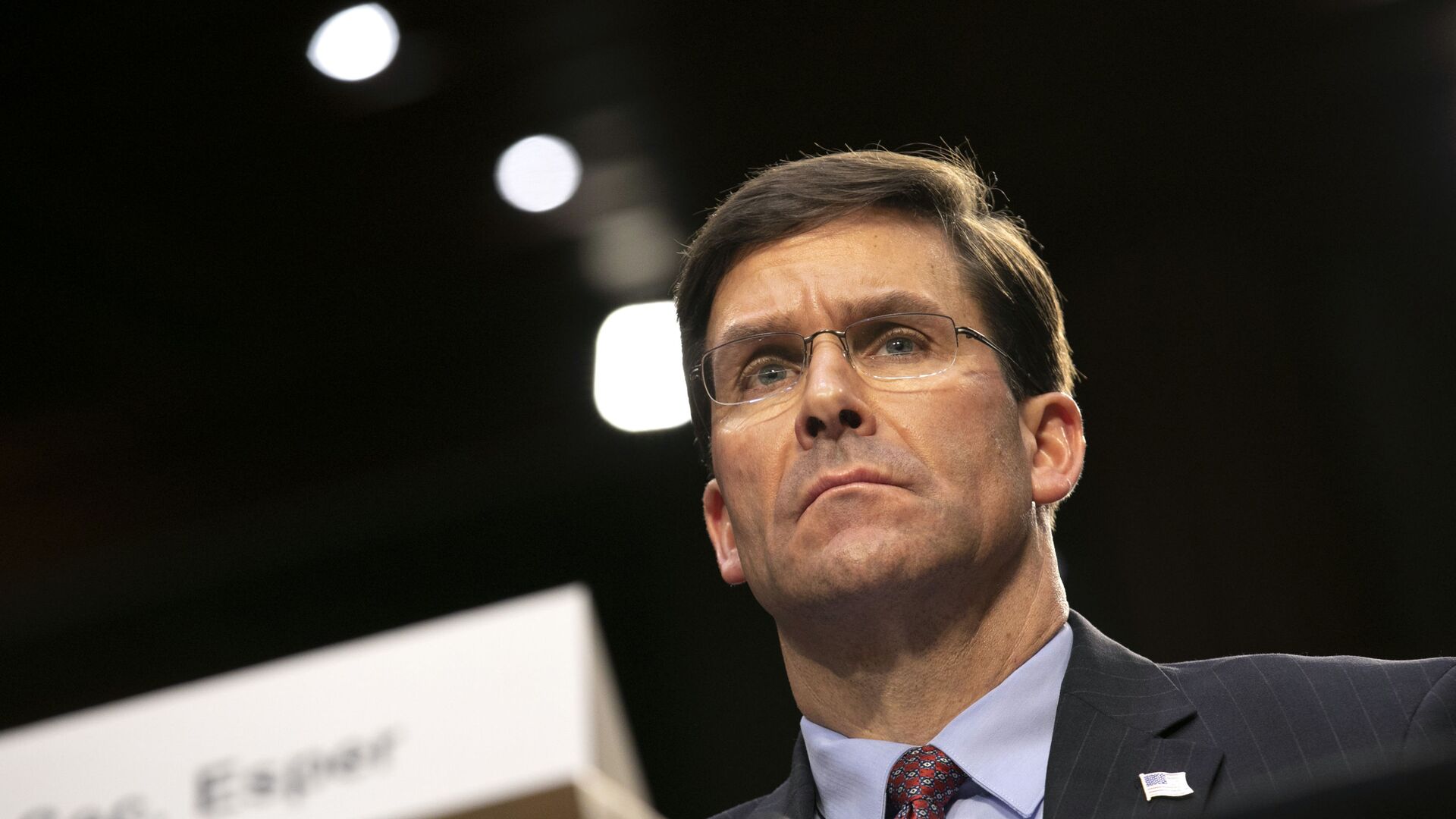‘Outlived its Usefulness’: From Taiwan, Ex-Pentagon Chief Esper Calls for End to One China Policy
18:02 GMT 19.07.2022 (Updated: 12:44 GMT 19.06.2023)

© AP Photo / Jacquelyn Martin
Subscribe
Speaking on Tuesday in Taiwan, former US Defense Secretary Mark Esper said Washington should end its longstanding policy of recognizing the People’s Republic of China (PRC) as the legitimate government of all of China, including over Taiwan island, and make a firm commitment to defending Taiwanese independence.
“It is my personal view that the one-China policy has outlived its usefulness, that it is time to move away from strategic ambiguity,” Esper told Taiwanese President Tsai Ing-wen in a meeting in her office on Tuesday.
Since it switched recognition of the Chinese government from the Republic of China (ROC) in Taipei to the PRC in Beijing in 1979, the US has continued to informally support Taiwan’s autonomy by funneling the government weapons and giving it political cover abroad. However, since a declaration of independence from China would mean war, the US has left it unclear as to whether it would defend Taiwan in the event of an attack by the People’s Liberation Army (PLA).
This “strategic ambiguity” is also believed to have deterred Chinese attack, preserving the status quo of Taiwanese autonomy from the mainland since the communist victory in 1949 that led to the foundation of the PRC.
Several times since taking office in January 2021, US President Joe Biden has had to walk back unambiguous and false statements about the US being obliged to defend Taiwan. Following the most recent faux pas in late May, US Secretary of State Antony Blinken was compelled to state that Washington “remains committed” to the One China Policy.
"We do not support Taiwan independence, and we expect cross-strait differences to be resolved by peaceful means," the chief diplomat added.
Esper told Tsai it was “important that we begin that national discussion [on strategic ambiguity] back in the United States. It would help us educate the American people if we can also point to bold decisions being made in Taipei.”
“It is important that the American people and our leaders in Washington fully see that the Taiwan people are fully committed to standing up to communist China and defending themselves as we, the democracies of the world, stand behind Taiwan,” he added.
Bipartisan Taiwan Support
Among Washington war hawks and anti-China politicos, Esper’s ideas are popular. Last month, a group of bipartisan senators, including Sens. Lindsey Graham (R-SC) and Bob Menendez (D-NJ), called on Biden to designate Taiwan a “major non-NATO ally” and dramatically increase military support for Taipei.
“As Beijing continues to seek to coerce and isolate Taiwan there should be no doubt or ambiguity about the depth and strength of our determination to stand with the people of Taiwan and their democracy,” Menendez said in a news release.
Esper, who led the Pentagon for two years under Republican former US President Donald Trump and is a former vice president of defense contracting giant Raytheon, said essentially the same thing in Tsai’s office on Tuesday.
“But the greatest challenge facing the democracies of the West today is not in Russia. It is here in Asia where China continues to challenge the rules-based international order [and] threatens freedom-loving people throughout the region,” Esper said, adding that Taiwan was on the front lines of that challenge and that the US and other “Western democracies” had to stand up and defend Taiwan from Beijing.
Esper arrived in Taiwan on Monday for a four-day visit at the head of a delegation sent by the Atlantic Council, a hawkish “Atlanticist” Washington think tank with major influence over US foreign policy. He was accompanied by two leading academics from the institution. Theirs is the latest in a series of high-profile visits by Americans in recent years, including Esper’s Trump administration comrade, former Secretary of State and former CIA director Mike Pompeo.
Pelosi Reschedules Taiwan Trip
House Speaker Nancy Pelosi (D-CA), the third-highest-ranking politician in the United States after the president and vice president, announced on Tuesday that she had rescheduled a visit to Taiwan that was originally scheduled for this past spring but was postponed when she contracted COVID-19. The visit is now slated for August.
Chinese Foreign Ministry spokesperson Zhao Lijian denounced Pelosi’s visit on Tuesday, but did not speak directly to Esper.
“We firmly oppose any form of official interaction between the US and the Taiwan region,” Zhao said. “If Speaker Pelosi visits Taiwan, it would seriously violate the one-China principle and the stipulations in the three China-US joint communiqués and harm China’s sovereignty and territorial integrity. It will have a severe negative impact on the political foundation of China-US relations, and send a gravely wrong signal to ‘Taiwan independence’ separatist forces. China firmly opposes such a visit.”
He also attacked the Taiwan Relations Act, the US law passed in 1979 that outlines Washington’s “obligations” to Taiwan and is often cited as justification for pro-Taiwan US policies, saying it “seriously breaches widely recognized international laws and basic norms in international relations and runs counter to the one-China principle and the stipulations in the three China-US joint communiqués.”
“The so-called ‘Taiwan Relations Act’ is a domestic legislation unilaterally adopted by the US,” Zhao said. “China has never recognized the Act and has always rejected it. A domestic law like this is no justification or rationale for the US to brazenly interfere in China’s internal affairs and sell arms to Taiwan.”


